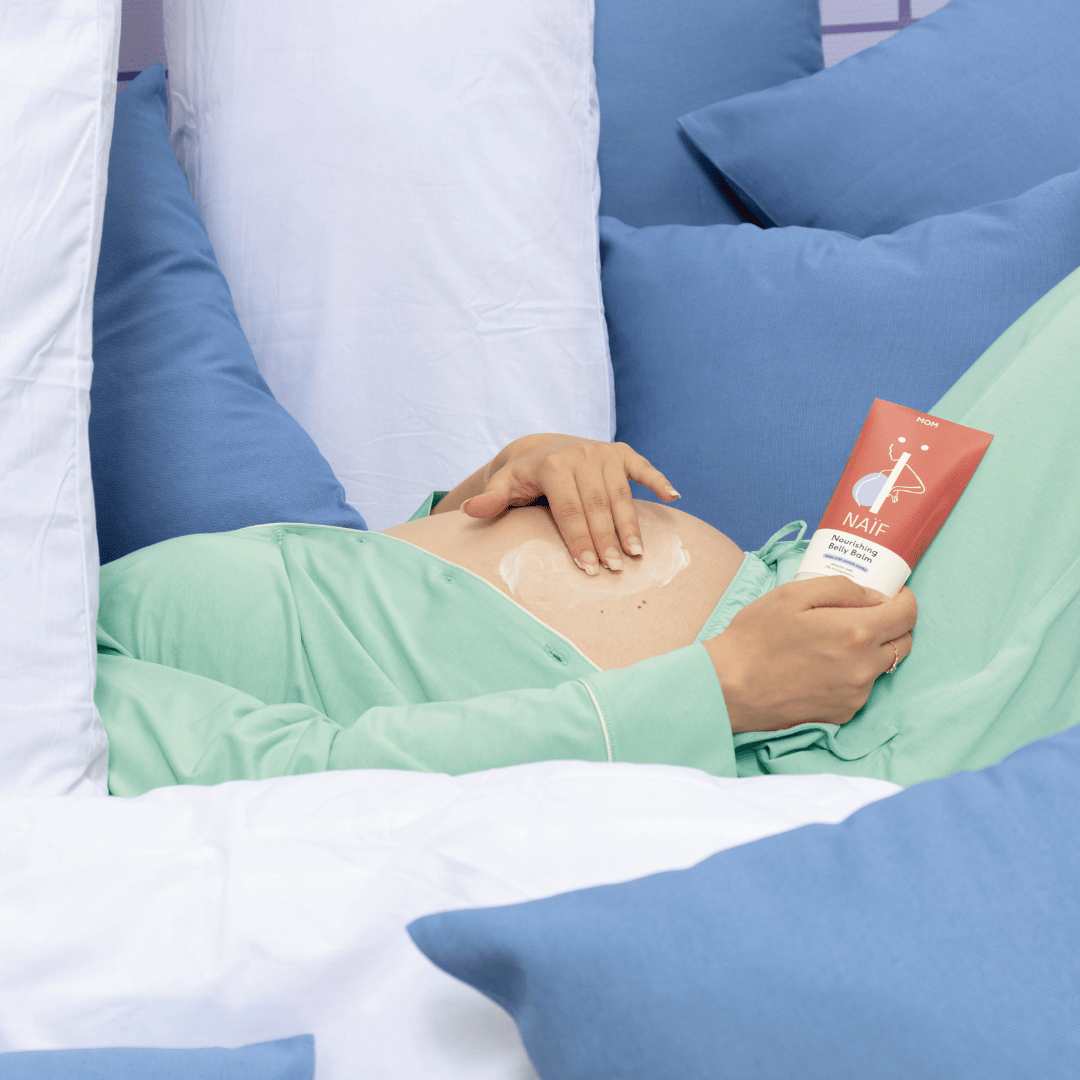Pregnancy
The first trimester: insecurity, sickness and emotions
23 April 2025

Maybe you've been dreaming of this moment, or maybe it came as a complete surprise: the positive pregnancy test in your hands. That moment when you see those two lines brings a whirlwind of emotions. From excitement or panic to tension and uncertainty. The first 13 weeks (3 months) of pregnancy are known as the first trimester. This is the time when you may start experiencing the first (unpleasant) symptoms. A lot is happening in your body and in your mind, and that can be quite a challenge. Here's what you can expect during the first trimester.
In 13 weeks a fertilized egg grows into a 7 cm foetus. This might seem small, but know that all the important organs are already in place at this point. Naturally, this process requires a lot of your energy (read: extreme tiredness!), your body and your mind. Hormones are flying around and you suddenly feel very pregnant. Which symptoms you experience is different from person to person, but there are some things that most people have in common during the first trimester. Here's what you can expect to happen.
Happy!
Suddenly that second stripe shows up on your pregnancy test. Wow, so many thoughts and emotions. A wave of happiness? Surprise? There may be slight panicking? Or everything at once? It doesn't feel quite real yet and you might need some time to digest the news. And then? You get to enjoy this new adventure. But it's not at all weird when it takes some time to get there and a lot of other emotions are present as well.
Scared of the unknown
The first trimester comes with a lot of excitement and uncertainty. You have no idea what to expect, and that tiny grain-of-rice-sized being inside of you still feels so abstract. Is everything going well in there? Symptoms, no symptoms? Your mind is all over the place. Maybe you're already thinking about the future: what will your life look like, what do you need to take care of before the baby arrives? Wow, it’s a lot to take in.
The most important thing is to allow yourself to feel all these emotions. Let all the feelings just be there. There’s really no point in fighting it.
After the first trimester, these feelings often start to ease. Your baby begins to take shape (literally!), you usually start to feel a bit better, and you gain more confidence that everything is going to be okay.
Tired
There comes a point when your body is working incredibly hard to grow a baby. This, combined with a massive surge in the hormone progesterone, leads to extreme fatigue. It’s a kind of tiredness you might not even recognize. It’s not like pulling an all-nighter though that might also be the case (hello, poor sleep! Pregnancy insomnia is real). It’s different. You can be so exhausted that you could literally fall asleep at any moment during the day.
On top of that, your placenta is developing, and your blood pressure and blood sugar levels are dropping. The good news? This intense fatigue usually fades after the first trimester. In the meantime: surrender to it and sleep whenever you can. Your body needs it.
Nausea
It’s probably the most well-known pregnancy symptom: nausea. It’s often referred to as morning sickness, but unfortunately, it can happen at any time of day. Some women actually feel most nauseous in the evening. And some (the lucky few) don’t experience it at all.
For a long time, we didn’t really know what caused pregnancy nausea, but research from 2023 suggests it’s likely linked to the hormone GDF15. If the levels of this hormone rise significantly during pregnancy—more than the woman’s body is used to—nausea can occur. Nausea usually peaks around the 9th week of pregnancy and then gradually starts to fade. Unfortunately, there are also women who experience nausea throughout their entire pregnancy due to Hyperemesis Gravidarum, more commonly known as HG.
So what can you do about it? For many women, it helps to eat something. You might not be up for a full meal when you’ve spent half the day over the toilet, but eating small amounts throughout the day can really make a difference. Sometimes, all you can manage is a plain cracker and that’s totally okay. Don’t stress too much about what you eat during this phase; the most important thing is that you eat (and drink!). It's often said that drinking ginger tea helps to relieve nausea. It might work for you too.
If the nausea becomes unmanageable, talk to your midwife or GP. And definitely reach out if you can’t keep anything down at all. There are medications that can help. Lastly, try to remind yourself that this is a (very unpleasant) phase, but you just need to get through it. It's for a good cause and it will get better soon.
Lots of emotions
The hormonal changes, extreme tiredness and the fact that you're pregnant are a great combination for a rollercoaster of emotions. One moment you feel on top of the world, and the next you crash. It's all good though and unfortunately part of the deal. Make sure you get enough rest when you notice you're getting moody en don't fight it.
Pee times three
Although theres no belly yet, you might notice that you need to pee more often in the first trimester. Why, you might wonder? The pregnancy hormone hCG causes more blood flow to your kidneys. And this the amount of blood in your body will increase with 50% while pregnant (say what!?) which causes more fluids going through your kidneys. And where does it end up? Exactly, in your bladder. Unlike other pregnancy symptoms, this will not go away after the first trimester. It might even get worse once the baby gets bigger and there is less space for your bladder.
Obstipation
On the one hand you pee more, but on the other one a lot of women deal with obstipation. It's all due to the hormone progesterone, which makes you bowel movements slower. Your growing uterus also plays a big role in this, since your bowels are getting less space within your belly. What to do? Make sure you drink a lot of water, eat a lot of fibers and make sure you move enough. Worried about your bowel movement, contact your midwife or general practitioner, they can help you out with some natural remedies or medicine if necessary.
Table of contents
Everything for your pregnancy
Read all tips you might need during your pregnancy

Pregnant? We’re there for you!
There are a lot of changes during pregnancy. And that is pretty exciting! Those first 1.000 days are important for a baby. Let us help you with all your questions and worries. Sign up for our newsletter and be the first to know about.. well everything!



